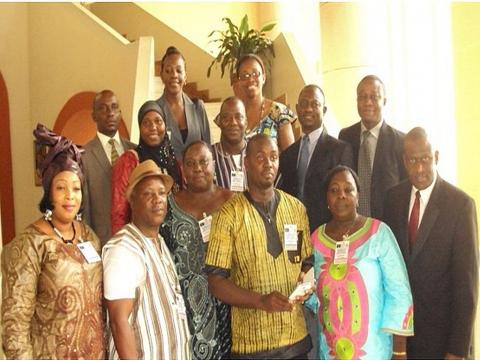By Zainab Joaque in Abuja
The Acting Director at the Department of Political Affairs at the African Union (AU) Commission in Addis Ababa, Olabisi Dare has called on member states to domesticate the Internally Displaced Persons (IDPs) Convention now and take the various measures outlined therein to ensure its implementation. He said such a step would also “answer to the cries of these displaced populations”. In his opening remarks at an African Union workshop on the implementation and domestication of the Kampala Convention on IDPs in Abuja-Nigeria this week, Dare disclosed that Africa was home to almost 12 million IDPs, slightly less than half the world’s total. “Almost all IDPs live under very vulnerable conditions. We have a rich and long tradition of helping people displaced across national boundaries or different places within our own countries” he said, adding that African nations had helped millions of refugees find durable solutions for their problems. He said these problems ranged from colonial oppression, internal conflicts, natural disasters to instability and war. Mr. Dare observed that under the terms of the convention, upon ratification, states parties would be obliged to adopt implementing national legislation, designate a body to coordinate activities aimed at protecting and assisting IDPs and provide the necessary resources to deliver such activities. “States should also create an effective legal and institutional framework to enable implementation of the Convention” he added. The African Union, he went on, had continued to take concrete and decisive measures to find peaceful resolutions to conflict and instability that displaced millions of people. These measures include strengthening humanitarian action, protecting of the most vulnerable and paving the way for durable solutions to their problems. In his statement the IDPs Focal Person at the National Emergency Management Agency (NEMA) of Nigeria, Major James Eze said Nigeria was highly interested in implementing and domesticating the Kampala Convention “because we have our own fair share of the large movement of people” to ensure that issues surrounding IDPs and their interests and rights were followed respected. “We encourage states who have not set these state emergency management agencies to do so now as it is obligatory for countries to enforce this convention to the latter” he said. He said NEMA recently held a dialogue meeting with Emergency Management Agencies to get the exact numbers of IDPs in the country. He said they were highly concerned with mass displacement and realized that there were certain needs they were not able to provide for vulnerable persons like women and children. “When we establish camps we have women representatives there, [because] the women feel free to complain to their fellow women, and they in turn report to NEMA for appropriate action with regards their needs, it is easy for the flow of information” she said. The workshop brings together Nigerians and Sierra Leonean participants from the Sierra Leone High Commission in Ethiopia. Also present are representatives from the UNHCR, the parliaments, human rights commission, civil societies, IDPs implementing agencies and the media. The AU Convention for the Protection and Assistance of Internally Displaced Persons (IDPs) in Africa, known as the Kampala Convention, came into force on 6 December 2012 after Swaziland had ratified it as the 15th member state to do so, followed by Mali. It is the world’s first legally binding instrument for the protection and assistance of people displaced within their own countries across an entire continent. Fourteen other member countries have also ratified it. They are Benin, Burkina Faso, Central African Republic, Chad, Gabon, the Gambia, Guinea-Bissau, Lesotho, Niger, Nigeria, Sierra Leone, Togo, Uganda and Zambia. Thirty-seven other African Union members have signed the Convention but are yet to ratify it, thus they are not legally bound by it.








